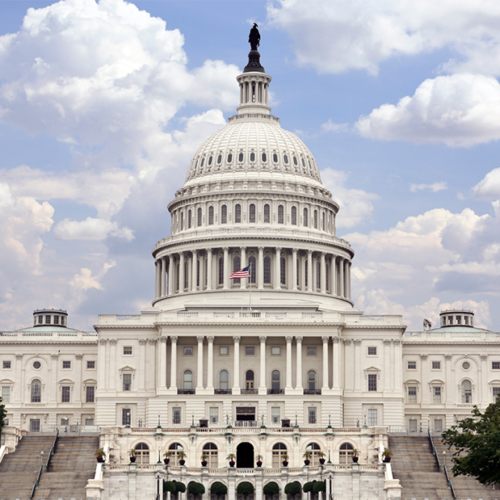
Congress Approves Spending for Key Federal Criminal Justice Programs
Federal funding for key criminal justice programs has been approved for FY20— including the Mentally Ill Offender Treatment and Crime Reduction Act (MIOTCRA), the Justice Reinvestment Initiative (JRI), and the Second Chance Act.
On December 22, 2019, President Donald Trump approved funding for key criminal justice programs for FY2020—the Mentally Ill Offender Treatment and Crime Reduction Act (MIOTCRA), the Justice Reinvestment Initiative (JRI), and the Second Chance Act. These initiatives are aimed at increasing public safety and reducing recidivism at the local and state levels.
Specifically, the packages include:
- $33 million for the Justice and Mental Health Collaboration Program (JMHCP), which was authorized under MIOTCRA and reauthorized under the 21stCentury Cures Act. JMHCP ensures criminal justice and mental health systems throughout the country have the funds they need to serve some of the nation’s most vulnerable people. The law funds mental health courts, mental health and substance use disorder treatment for people in the criminal justice system, community reentry services, and local law enforcement training to help officers identify and improve their responses to people who have mental health needs.To date, MIOTCRA appropriations have funded 186 mental health courts and other court-based initiatives, supported 146 local police departments, and provided 483 grants to 49 states, plus the District of Columbia, Guam, and American Samoa.
- $28 million for JRI, a data-driven approach that helps states reduce corrections and related criminal justice spending and reinvest their savings in strategies that improve public safety. Since 2010, more than 35 states have deployed the justice reinvestment approach to develop policies to slow overall prison growth, and for some states, reduce the total prison population. States have reported cumulative savings and averted more than $1.1 billion in costs while also investing millions in effective supervision and treatment programs to make communities safer, including improving community supervision, expanding community-based treatment and services, creating grants to support local law enforcement, enhancing victims’ services, and more.
- $90 million for the Second Chance Act, which was reauthorized under the landmark First Step Act of 2018. Since its enactment, recipients of Second Chance Act grants have worked to improve outcomes for people returning to their communities from prisons and jails, providing vital services—including employment training and assistance, substance use disorder treatment, education, housing, family programming, mentoring, and victims support. There have been more than 900 grants awarded in 49 states, the District of Columbia, and U.S. territories, allowing jurisdictions to develop, improve, and expand reentry programs and policies. Second Chance Act grantees have served more than 164,000 participants since 2009.
- $75 million to expand on the First Step Act and develop opportunities for federally incarcerated individuals to participate in evidence-based, recidivism-reducing programming and productive activities.
Below is a breakdown of the criminal justice programs funded by the FY2020 appropriations packages.
| Program | FY2018 Omnibus | FY2019 Omnibus | FY2020 Bill |
| Mentally Ill Offender Treatment and Crime Reduction Act | $30m | $31m | $33m |
| Justice Reinvestment Initiative | $25m | $27m | $28m |
| Second Chance Act | $85m | $87.5m | $90m |
When returning to their communities from criminal justice settings, people with behavioral health needs face barriers in accessing…
Read MoreNew Hampshire Department of Corrections Commissioner Helen Hanks presents at the Medicaid and Corrections Policy Academy in-person meeting.
Read MoreThe Council of State Governments (CSG) Justice Center has launched the Collaborating for Youth and Public Safety Initiative…
Read More Assigned to the Cloud Crew: The National Incarceration Association’s Hybrid Case Management for People with Behavioral Health Needs
Assigned to the Cloud Crew: The National Incarceration Association’s Hybrid Case Management for People with Behavioral Health Needs
When returning to their communities from criminal justice settings, people with behavioral…
Read More Meet the Medicaid and Corrections Policy Academy Mentor States
Meet the Medicaid and Corrections Policy Academy Mentor States
New Hampshire Department of Corrections Commissioner Helen Hanks presents at the Medicaid…
Read More Six States Commit to Improving Statewide Strategies to Address Youth Crime, Violence and Behavioral Health
Six States Commit to Improving Statewide Strategies to Address Youth Crime, Violence and Behavioral Health
The Council of State Governments (CSG) Justice Center has launched the Collaborating…
Read More Bipartisan Group of 88 Lawmakers Push for Continued Funding for Reentry and Recidivism Programs
Bipartisan Group of 88 Lawmakers Push for Continued Funding for Reentry and Recidivism Programs
A bipartisan group of 88 lawmakers, led by Representatives Carol Miller (R-WV)…
Read More









